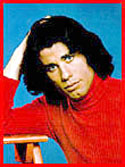
John Travolta

A merchandising
bonanza
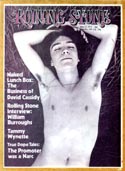
"On the cover of
the Rolling Stone..."
Troubled times...
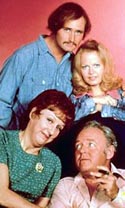
All in
The Family
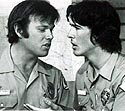
Emergency!
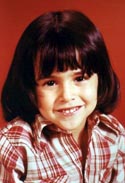
Ricky Segall
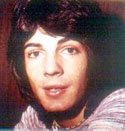
Rick Springfield

The End
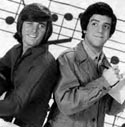
Getting
Together

Continued...
GH: At what point did David start to become difficult?
BC: Never. I don’t understand where any of this came from. Now this is me talking, and I don’t represent the world. But I never had one moment’s trouble with David Cassidy. I don’t think he gives himself a fair shake if he thinks he was that way with me. Because here is a guy who was traveling all over the world on the weekends, singing to screaming fans, and then sitting all day long on a dark soundstage to say 5 lines and play straight man for Danny. Ruth Aarons was his manager – Shirley’s too. A real great lady. She wouldn’t let him behave that way.
GH: Well, that’s nice to hear!
BC: I had John Travolta on “Welcome Back Kotter”. He had a contract he had to fulfill for the series, the same year he was nominated for an Academy Award [for “Saturday Night Fever” – ed.]. He couldn’t have been nicer. He came prepared. He came on time. David was the same way.
GH: Tell us about David’s contract re-negotiation, and what that was like?
BC: It was very simple. He was left unsigned, by mistake. As a minor, there are certain rules to follow, so in effect, he had no contract. The show was at it’s height, and it scared the hell out of us!! They (David and his manager) could have taken Screen Gems apart financially, but they didn’t. That was Ruth Aarons. I think he went from $600 a week to $3400 after the negotiations. I suppose he could have got three times that, but what was the point? He was making so much money with the music, that it was just more money to give away to taxes.
GH: David and the others signed over their names and likenesses for merchandising and never received any royalties from that. Were the actors given standard contracts for the time, and the level of their experience?
BC: Yes, it was the normal contract. Look, if you are an actor and you want a job, you sign the contract, right? When I took that major pay cut back in New York, I didn’t want that to happen either. But sometimes you take what you have to. The kids were getting scale at the time, and I think Danny was making $450.00 a week.
GH: Do you remember what Shirley was making?
BC: Well, it’s a guess, but I think she was making somewhere around $3000 - $4000 a week.
GH: When David’s contract was renegotiated to $3400 a week, would Shirley’s contract have had a favored nations clause? They weren’t going to pay David more money than the “star” of the show, were they?
BC: No. So they probably had to deal with it. My argument with all those money people at the time – Chuck Fries in particular, was: “If we weren’t so damn busy trying to screw people all of the time, when we got into a position like this, we would have found people who were a lot more sympathetic.”
GH: When did David officially give his “notice” that he was leaving the show after his new contract ran out?
BC: You know, I keep hearing that. I heard that on one of the specials that was just on. I don’t know what kind of notice there was, because to the best of my knowledge, he had a contract. He wasn’t going anywhere until that was up.
GH: It has been reported that ABC moved the show to Saturday Nights because they knew David wasn’t coming back for a 5th season, and it was a sacrificial lamb, trying to put a dent in the ratings of “All In The Family”.
BC: NO! That is so wrong! They all say that and it is wrong! Let me tell you what happened to the show, and I can prove it. They put us on Saturday, up against “All In The Family” and “Emergency”. You will notice in the fourth year, there is a little boy named Ricky Segall that was added to the show. I don’t like to say bad things about him, because it’s not his fault. But the show was obviously beginning to fail at the end of the preceding year. So, it was somebody’s idea at the network to put him into the show, and sing songs that his father wrote. I fought them tooth and nail on this, and asked that the show be allowed to go down with some kind of dignity. I couldn’t imagine why people would tune in to see this. I could barely get through dailies watching it. My point is – why would we have done that if the show was a big hit and David was going to quit?! We knew at the end of the third year that the show would not make it past the fourth year. It was over. We knew it, the actors knew it, and the record producers knew it. There was no way it was not going to be over. I don’t know why people keep thinking otherwise. We knew far in advance that there would be no more episodes and no more records. Actually, I was surprised it came back for a fourth year.
GH: Well, David has given interviews saying how badly he feels, in retrospect, that his departure put so many people out of work.
BC: Well, he’s wrong! There was not a chance. The show was third from the bottom in the Nielsen ratings. Doesn’t that tell you something? Why would he think the show would have been renewed for a 5th season had he stayed? Believe me, the show ran its course.
GH: In an attempt to change his squeaky-clean image, David threw a wrench in the works by posing nude for Rolling Stone magazine. What kind of fallout happened as a result of that?
BC: First of all, I didn't read it. So I can't comment on the content. I remember it being discussed, but it didn't cause any major problems on the set. The public tends to make more of a racket over these things than we did, and as time goes by, I think the story gets bigger, and the impact gets more exaggerated. Look, he was a young kid that wanted to change his image. It didn't hurt the show's ratings, that's for sure. I know Chuck Laufer and the teen magazines were probably bothered more so than I was, because they are the ones perpetuating the image he was trying to break. David had a contract and showed up every day. I don't even remember ever sitting down with my people and discussing it. Maybe at lunch, but it was no big deal. I probably said, "I wish you had consulted me first" or something like that, but it was over real fast. If anything, the higher ups at Screen Gems probably discussed it more.
GH: Before the ratings fell, were there ever any plans to try and bring someone else in to replace him?
BC: We talked about that, sure. We had to talk about it. Rick Springfield’s name came up and someone else’s did too. But it was pointless, and I was very disinterested. Look, people get desperate. When you sit in meetings in these production companies, and a show start to cool, they get crazy! They’ll start some kind of promotion, or send people on a tour. I wanted to be done with it because it was over. I have never seen a TV show that was going down in the ratings get saved. The audiences were done with it. David Cassidy could have said he is signing on for 12 more years, and it wouldn’t have mattered. Also, if the network really wanted to, they could have made a deal that David would have had to think twice about refusing.
GH: Ricky Segall was only used in a handful of episodes in the fourth year. When the ratings still slid, did the network ask for his removal?
BC: At that point, they didn’t care whether we kept him or not. Renee [Valente] and Jackie [Cooper] thought he was cute, and maybe he could get a following. I didn’t think it would work. It was a terrible idea.
GH: Were you involved in the spin-off, “Getting Together”?
BC: Yes, I was the Executive Producer on that as well. We had great people on the show. Jack Burns, Pat Carroll, and Bobby Sherman was a great guy.
GH: Why do you think it didn’t catch on?
BC: First of all, it was in that same suicide time slot that The Partridge Family was moved to. Also, I think perhaps Bobby’s popularity was waning as well, so he didn’t have the following anymore. By that point, David was becoming the hot thing.